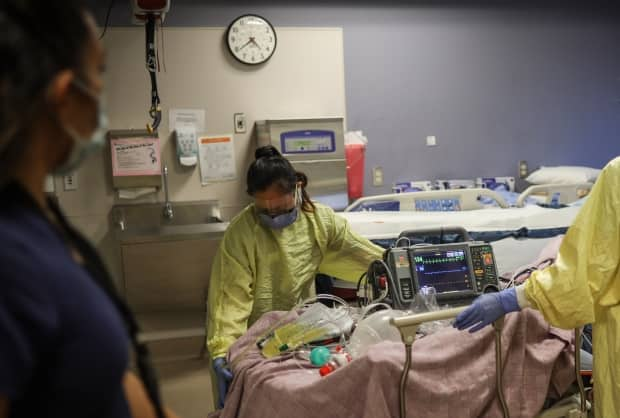Alberta health-care system sets another record with 312 patients in intensive care

Alberta has set yet another record for the number of patients requiring critical care as the health-care system buckles under the pressure of the pandemic's fourth wave.
There are currently 312 patients in intensive care units (ICUs), the vast majority of whom are COVID-19 positive, an Alberta Health Services (AHS) spokesperson said in a statement Monday morning.
AHS continues to open additional ICU spaces and redeploy staff to meet patient demand, including opening another 38 surge beds in the past week, the statement said.
During that same period, ICU patient numbers have increased by 11 per cent, AHS said.
There are currently 370 ICU beds in Alberta, including 197 surge spaces. ICU capacity, including surge beds, is at 84 per cent, AHS said.
AHS says the Calgary zone has 133 ICU beds, including 67 additional spaces. It is operating at 80 per cent of surge capacity.
In the Edmonton zone, there are 158 ICU beds, including 86 additional spaces. It is operating at 87 per cent of surge capacity.
Alberta doctors raise warning
A letter addressed to the public from the Alberta Medical Association's intensive care section paints a grim picture should the situation continue to worsen.
"We remain on the verge of a health system collapse in Alberta," it reads.
Critical care units require a specialized workforce, but despite additional staffing, there are insufficient numbers of these health-care workers to keep up with the increasing ICU patient numbers, the letter says. As a result, the number of patients assigned to each nurse has increased.
WATCH | Calls for 'firebreak' lockdown in Alberta:
Dr. Sean van Diepen, a critical care physician who signed the letter, said in an interview Monday the system has run out of experienced people.
"We have fewer trained people than in previous waves. A lot of nurses have left the profession — retired, left for mental health issues, burnout," he said.
"I don't think I can understate enough just how burnt out and tired people are at this point."
The letter warns that, in a worst-case scenario, triage protocols would be activated.
A 52-page critical care triage protocol developed by AHS describes how the health-care system would ration care if ICUs no longer have the resources to care for every critically ill patient.
"I think it's a realistic possibility given our current state," van Diepen said.
Another news release Monday from the entire Alberta Medical Association calls for the province to institute "significant and immediate" public health measures as a "fire-breaker" to aggressively control COVID-19 cases and protect the health-care system.
AMA president Dr. Paul Boucher said increasing the vaccination rate will help in the future but will not make a difference in facing down this wave of the pandemic.
"What we are calling for exactly is a tight lockdown again like we saw last spring in order to allow case numbers to fall," he said Monday.
"We're deep in it now — nostril or two above water — and dangerously close to having to make some very difficult decisions."
It has now been 11 days since Premier Jason Kenney first introduced a slew of new public health measures and one week since many went into effect, including the restrictions exemption program, which is Alberta's version of a vaccine passport system.
As of Monday, there were 21,307 active cases of COVID-19 in the province and 1,063 people in hospital, including 265 in intensive care.

